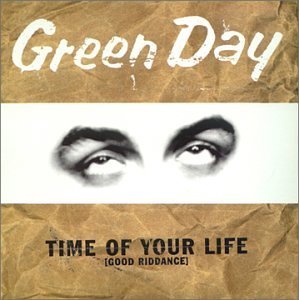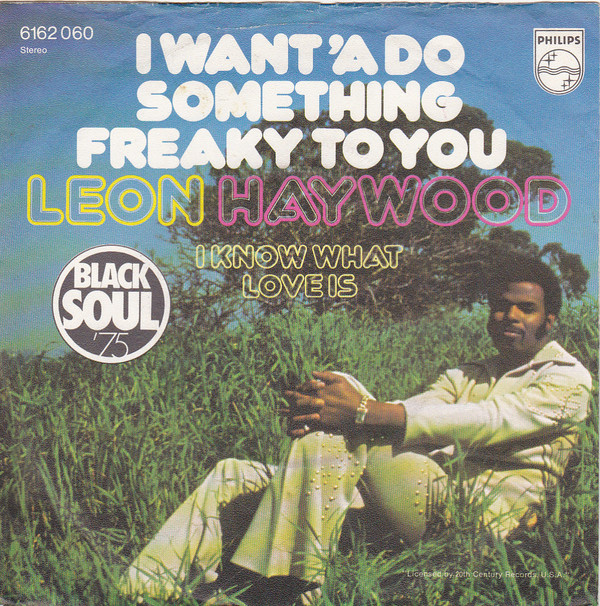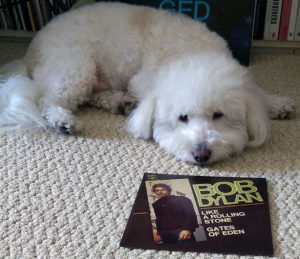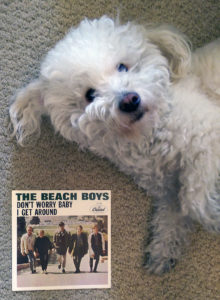
Inspired by the February 17 birthdays of Green Day’s Billie Joe Armstrong, Gene Pitney, Paris Hilton, Bobby Lewis, Tommy Edwards, John Leyton and Röyksopp’s Svein Berge.

Inspired by the February 17 birthdays of Green Day’s Billie Joe Armstrong, Gene Pitney, Paris Hilton, Bobby Lewis, Tommy Edwards, John Leyton and Röyksopp’s Svein Berge.

Today’s playlist is inspired by the February 11 birthdays of Sheryl Crow, D’Angelo, First Choice’s Rochelle Fleming, Gene Vincent, Brandy, Sergio Mendes, Bobby Pickett, Leon Haywood, City Girls’ Yung Miami, and Gerry Goffin (former songwriting partner and husband of Carole King).
Today is the day after Thanksgiving here in the United States of America. You’re officially allowed to start listening to holiday music now. To get you started, I compiled a playlist of what I consider to be 100 of the best Christmas songs. Okay, 98 songs, a stand-up routine and a skit. It’s a mix of standards, versions of standards with which you may not be familiar, and obscure but delightful tunes.
Enjoy!
Click here to like Tunes du Jour on facebook!
Follow me on Twitter: @tunesdujour
Follow me on Instagram: @glennschwartz

No other pop song so thoroughly challenged and transformed the commercials laws and artistic conventions of its time, for all time.
– Rolling Stone, naming Bob Dylan’s “Like a Rolling Stone” the greatest song of all time
If it came out now, it would still be radical. For 1965, it was mind-blowing, as was its success. Six minutes long, sung by a guy who sounded nothing like the other singers on the radio, with confrontational often insulting lyrics. Somehow, it went all the way to #2 on the Billboard Hot 100, kept from the top spot by The Beatles’ “Help!” As Rolling Stone wrote, “Just as Dylan bent folk music’s roots and forms to his own will, he transformed popular song with the content and ambition of “Like a Rolling Stone.”
Thanks in part to “Like a Rolling Stone” and “Help!” and Motown and Stax and the Rolling Stones and other British Invasion acts, 1965 was one of the best years for pop music. Tunes du Jour celebrates Throwback Thursday with a second playlist of tracks from this stellar year (the first playlist can be found here), kicking off with a Bob Dylan record that changed the rules.
Click here to like Tunes du Jour on Facebook!
Follow me on Twitter: @TunesDuJour
Follow me on Instagram: @GlennSchwartz
Between the British invasion, the growth of Motown, and the girl group sound, many arguments could be made as to why 1964 was the best year for pop music. Here are twenty:
Click here to like Tunes du Jour on Facebook!
Follow me on Twitter: @TunesDuJour
Follow me on Instagram: @GlennSchwartz

Brian Wilson of the Beach Boys calls “Be My Baby” by the Ronettes his favorite single of all-time. So blown away by the song he was that he attempted to match it. He wrote a song in the same key, E Major, and opened his song with the same drum riff that opens “Be My Baby.” The title of Wilson’s composition was inspired by his then wife, Marilyn. When he wondered if he could write a song as good as the Ronettes one, she said to him “Don’t worry, baby.”
Wilson’s “Don’t Worry Baby,” as recorded by his group the Beach Boys, is a classic in its own right. It kicks off our playlist celebrating Wilson’s 74th birthday, which coincides with the first day of summer, which makes sense. Here are twenty of Brian’s greatest contributions to popular music.
Click here to like Tunes du Jour on Facebook!
Follow me on Twitter: @tunesdujour
Follow me on Instagram: @GlennSchwartz
The girl group sound was hugely popular on the US pop charts in the early 1960s. The Shirelles, The Crystals, The Chiffons, The Angels, Martha and the Vandellas, The Marvelettes, The Exciters, The Orlons, The Cookies, The Murmaids, The Dixie Cups, The Supremes, The Toys, The Shangri-Las, The Jaynetts and others filled the radio with tales of teenage romance, heartbreak and occasionally social commentary. Solo acts such as Lesley Gore and Darlene Love also exemplified the girl group sound.
Described in the Library of Congress’ National Recording Registry as “the quintessence of the ‘girl group’ aesthetic of the early 1960s,” the Ronettes’ “Be My Baby” reached #2 in 1963. The record was produced by Phil Spector, who produced at least 15 top forty girl group songs between 1962 and 1964.
Lead vocals on “Be My Baby” were performed by Ronnie Spector. In fact, the other Ronettes aren’t even on the record. Backup singers included the girlfriend of Phil Spector’s promotion man. That man was Sonny Bono; his girlfriend was Cher. Sonny & Cher would have their first hit as a duo two years later.
This week’s Throwback Thursday playlist spotlights the hits of 1963. Here are twenty of that year’s best, kicking off with the record New Music Express named the second best song of the 1960s (their #1 was The Beatles’ “A Day in the Life”), the Ronettes’ “Be My Baby.”
Click here to like Tunes du Jour on Facebook!
Follow me on Twitter: @TunesDuJour
Follow me on Instagram: @GlennSchwartz
Some time in my teen years I feel in love with the girl group sound. My favorite was The Crystals’ “He’s a Rebel.” The music and the vocals hooked me. The singer tells of how others don’t approve of the boy she loves as he’s a non-conformist, but he treats her well and that’s all that matters.
The story behind the record is as interesting as the record itself. The song was written by Gene Pitney, who had several hits of his own, including “Town Without Pity” and “(The Man Who Shot) Liberty Valence.” “He’s a Rebel” was slated to be the debut single for Vikki Carr, but when Spector heard Pitney’s demo he knew he wanted it for one of his acts, The Crystals.
He needed to record it quickly in order to challenge Carr’s version at the stores. The Crystals, however, were on the road in New York and unable to make the recording sessions in Los Angeles. No problem. Spector hired a local group called The Blossoms, led by Darlene Wright, to record the song. Wright was paid $3000 for the session. Spector released the record under the name The Crystals, as his label owned the name. The actual Crystals first learned of their new hit song when they heard it on the radio. It became their first #1 single, meaning The Crystals had to learn this song so they could perform it at their shows. The group’s lead singer, Barbara Alston, could not match Wright’s vocal performance, so fellow Crystal LaLa Brooks moved into the lead vocalist slot. Coincidentally, the week The Crystals’ “He’s a Rebel” was #1, Gene Pitney was #2 as a singer with “Only Love Can Break a Heart,” a song he didn’t write.
As “He’s a Rebel” was so successful, Spector needed to get a follow-up single out quickly. Again, he turned to The Blossoms to record “He’s Sure the Boy I Love.” Wright, however, was angry that her name was not on “He’s a Rebel” and told Spector she would only do this song if she were singed to a recording agreement and was properly credited for her vocals on the track. Spector agreed, changing her name in the agreement to Darlene Love. He released “He’s Sure the Boy I Love.” It was credited to The Crystals.
Spector used the money he made from “He’s a Rebel” to buy out his business partners in the Philles Records label. In addition to the financial settlement, Spector had to give his two ex-partners a share of the royalties of the next Philles single release, so Spector got the real Crystals into the studio and recorded “(Let’s Dance) The Screw,” a silly number clearly not intended to be a hit. A copy was sent to one of the ex-partners. No royalties were generated.
Tunes du Jour celebrates Throwback Thursday with twenty great hits from 1962, kicking off with “He’s a Rebel” by “The Crystals.”
Click here to like Tunes du Jour on Facebook!
Follow me on Twitter: @TunesDuJour
Mike Love is an American musician, singer, songwriter, and activist who in 1965 founded the group Love with his sisters, Courtney, Darlene and Monie. He was nicknamed the “Yoko Ono of the Beach Boys,” not because he is a Japanese woman, but because in 1969 he married the Beach Boys’ Brian Wilson, who he met during a performance art piece entitled “Nail MC Hammer,” and in doing so, influenced the band’s musical direction away from songs about surfing, girls, cars, surfing girls, girls’ cars, and surfing cars, and toward more lyrically deep and musically complicated pieces, like “Kokomo.” Tom Jones paid tribute to Mike Love’s importance to the Beach Boys with the song “Without Love (There Is Nothing),” a top 5 hit in 1970. Jones was not the only musician to admire Love. Mike Love is considered a genius by all musicians named Mike Love.
In 1976, Love got his M.D. in Transcendental Medication. The band Kiss paid tribute to his achievement with their hit “Calling Dr. Love.” Other songs honoring the Rock and Roll Hall of Famer include “Love Can Make You Happy,” “Love is a Many-Splendored Thing” and “Love is All We Need.” Steven Tyler of Aerosmith bumped into Mike on an escalator at the Beverly Center, and wrote “Love in an Elevator” about the experience, changing the means of conveyance because “escalators ain’t musical, you know?”. In 1979, the r&b band Rose Royce (“Car Wash”) moved into the house that Mike Love moved out of a few years earlier. Annoyed by his deranged fans, who camped out on the front lawn 24-7, the band’s Gwen Dickey yelled out the window “Love don’t live here anymore!,” and a soul classic was born.
These days Love is a recluse, staying inside one of his homes in between concert dates, of which he does 729 each year. He only grants interviews to those who ask. I didn’t ask.
UPDATE: I just received an email from the “LAW OFFICES OF MIKE LOVE’S LAWYERS.” Per his attorneys, there are some factual inaccuracies in what I’ve written above. They write that while Mike Love will take credit for starting the band Love, the following things are not true:
Mike Love did not marry Brian Wilson. Wilson is Love’s cousin, and they are not from the South.
Mike Love is a founding member of the Beach Boys.
Mike Love does not have an M.D. Well, he has an M.D., but he himself is not an M.D. Kiss wrote that song for him because they feel he should have received an honorary doctorate.
Rose Royce never lived in any of Love’s homes, and the song “Love Don’t Live Here Anymore” was not written about Mike Love, though the other songs you referenced were.
Mike Love’s attorneys did not send Tunes du Jour an email.
Mike Love is a Japanese woman.
Coincidentally, they tell me that today is Mike Love’s 75th birthday. Tunes du Jour sends Love love. Here are twenty of his most loverly:
Click here to like Tunes du Jour on Facebook!
Follow me on Twitter: @TunesDuJour
“My mother used to tell me about vibrations. I didn’t really understand too much of what she meant when I was a boy. It scared me, the word ‘vibrations’ – to think that invisible feelings existed. She also told me about dogs that would bark at some people, but wouldn’t bark at others, and so it came to pass that we talked about good vibrations.”
– The Beach Boys’ Brian Wilson, Rolling Stone magazine
“The concept of spreading goodwill, good thoughts and happiness is nothing new, but it is our hope. The ideas are there in ‘Good Vibrations,’ ‘God Only Knows,’ ‘Heroes and Villains,’ and it is why the new LP is called Smile.”
– The Beach Boys’ Carl Wilson
According to Brian Wilson, Capitol Records didn’t want to release “Good Vibrations” as a single because of its duration: three and a half minutes. Reportedly, executives at the label were also concerned about the psychedelic overtones of the lyrics. Wilson pleaded with Capitol to release the 45.
The song went to #1 and earned the Beach Boys a Grammy nomination in the category of Best Contemporary Group Performance, in which they were pitted against three fine recordings plus “Guantanamera” by the Sandpipers. The Beach Boys lost, thankfully not to the Sandpipers but to the Mamas & the Papas for “Monday, Monday.” Mojo magazine placed “Good Vibrations” at #1 on their Top 100 Records of All Time list, and Rolling Stone magazine had it at #6 on their 500 Greatest Songs of All Time survey.
The crowning achievement of “Good Vibrations” by the Beach Boys was followed by an abrupt reversal of fortune for the group. While “Vibrations” was their 14th top ten single in just over four years, they would have to wait another ten years before cracking the top ten again, with their not-that-great remake of Chuck Berry’s “Rock and Roll Music” in 1976. It would be twenty-two years after “Good Vibrations” that the group hit #1 again, with the classic bad song “Kokomo.” The Smile album Carl Wilson referred to in the quote above went unfinished. Instead, the group released an album entitled Smiley Smile in 1967. Between 1963 and 1966 the group scored nine top ten albums; Smiley Smile peaked at #41. The following year’s Friends album only got as high as #126.
On this Throwback Thursday, Tunes du Jour listens to twenty of the finest singles from 1966, kicking off with the classic “Good Vibrations.”
Click here to like Tunes du Jour on Facebook!
Follow me on Twitter: @TunesDuJour